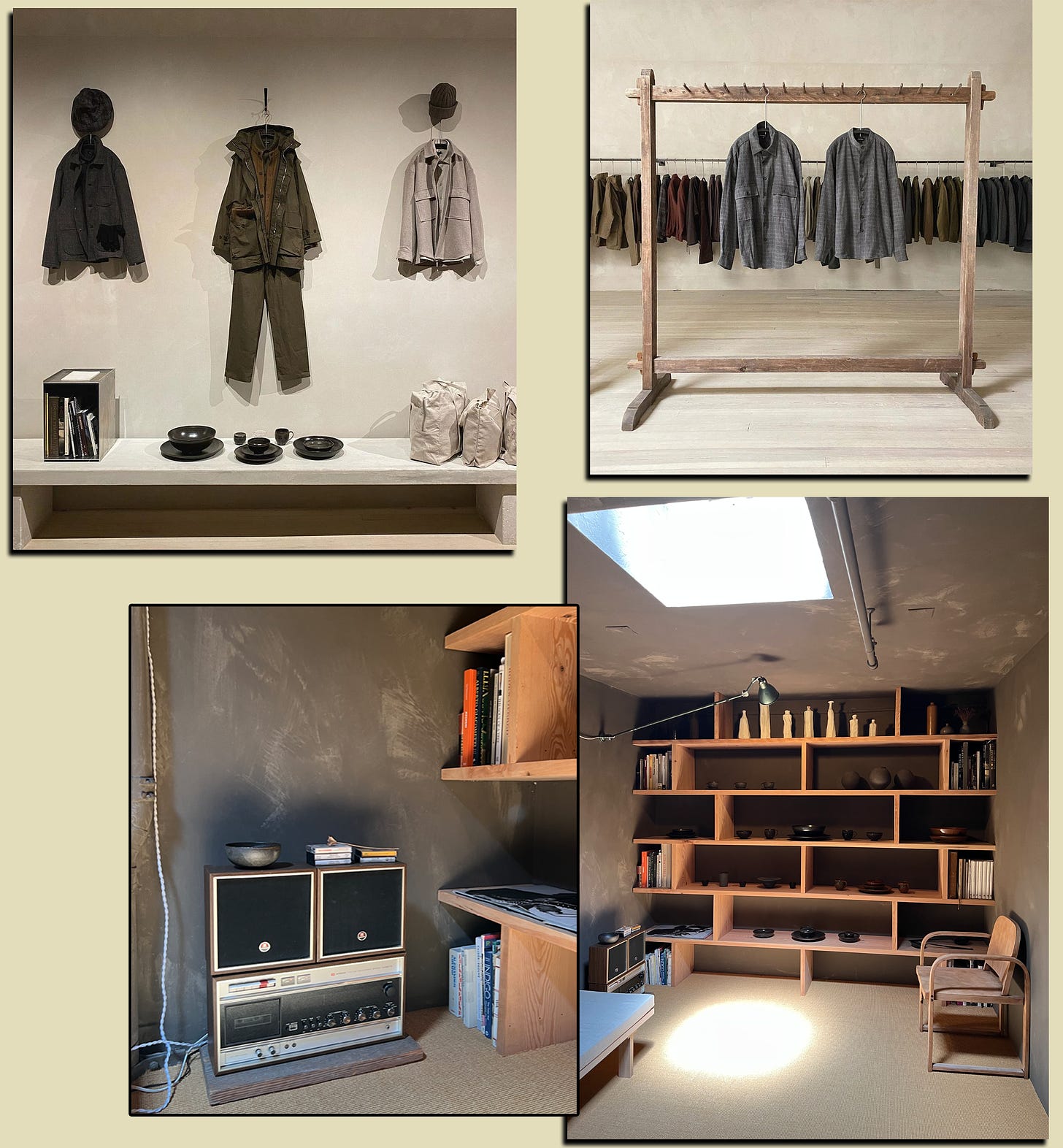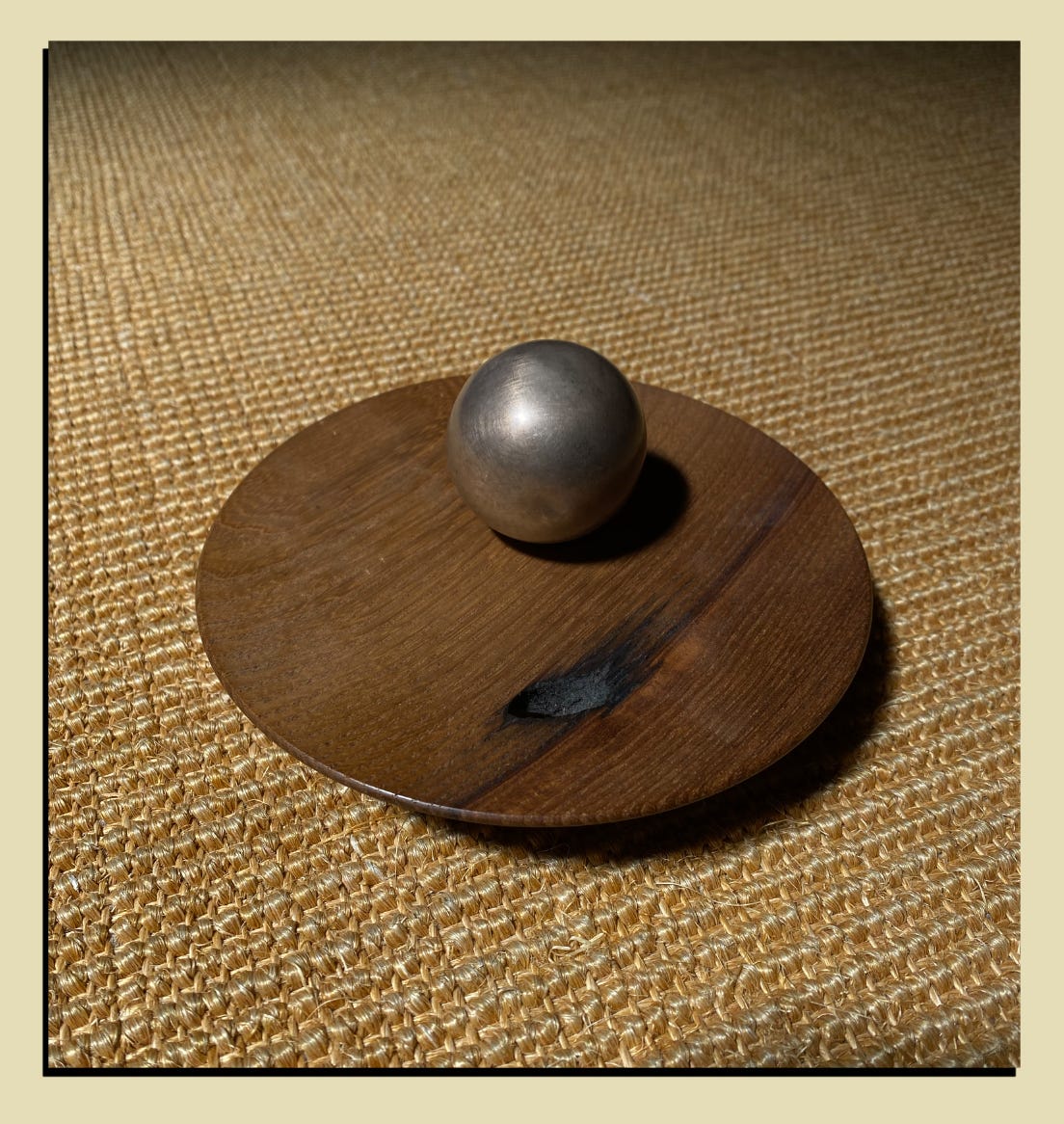Your clothes should feel heavy: The Evan Kinori Blackbird Spyplane Interview
The slow-and-steady design champion on keeping your priorities straight, and feeling the true weight of a jawn, in a world that wants us to lose our heads
Welcome to Blackbird Spyplane.
Our interviews with Nathan Fielder, Jerry Seinfeld, Tyler, The Creator, Emily Bode, Online Ceramics, André 3000, Matty Matheson, Lorde, John Mayer, Danielle Haim, Ebon Moss-Bachrach, The Kid Mero, Daniel Arnold, Thomas Mars from Phoenix, Phoebe Bridgers, Michael Stipe, Sandy Liang, Héctor Bellerín, John Wilson, Mike Mills, Ezra Koenig, Action Bronson, Seth Rogen and more are HERE.
— Jonah & Erin
Evan Kinori — he makes beautiful clothes and keeps his d*mn mission tight! Since launching his namesake line 7 years ago he’s returned to the same core set of simple, sturdy pieces, season in, season out, switching between different fabrics & materials, making incremental tweaks at most, and very occasionally releasing new designs. His unisex “Big Shirt” and “Elastic Pant” are two of our favorite pieces out — jawn-architectural marvels, ample but not shapeless, a perfect balance between understatement and boldness. (I have the shirt in an airy ecru linen gauze that wavers in the breeze like beautiful cheesecloth, baby!!)
Despite becoming “mad popping in the game” and reliably selling through his limited-run pieces, Evan sticks to a program of deliberate smallness & slowness 🐌. He avoids big stores; designs and (with one other person) cuts every pattern himself at his San Francisco studio; refuses outside investors; editions every piece he sells; sources fabrics from specialty textile mills in Italy, Japan and Germany; and contracts with factories that pay living wages, mostly in the Bay and Los Angeles, to make his clothes by hand.
In that way, he’s part of a decades-spanning lineage of cool Bay Area artists, designers and craftspeople who lovingly make real things — a lineage that can get overlooked in San Francisco’s hyper-swagless, tech-money-torched, virtualized present.

The other day we visited Evan at his studio on Valencia. He was preparing for the rollout of his fall collection — due out early next month — and dialing in spring 2023. We talked about the long-lasting appeal of ‘60s-era post-minimalism in art, music & clothes; 360-degree Rei Kawakubo design thinking; and his clear-eyed perspective on what’s wack, corny & heinous about the fashion business — and how to avoid it.
Blackbird Spyplane: You just got back from teaching a weaving- and garment-making workshop in Vermont with Marina Contro, a great Bay handweaver. How’d it go?
Evan Kinori: “Marina’s been teaching a summer course at the Marshfield School of Weaving for a few years, so I went last year, and it was amazing — you’re in northern Vermont, on a farm in the middle of nowhere, cows are beneath you in the barn, and all these other classes are going on while you’re there. This time there was a class about how to process flax into linen, and a plant-dye program where everything they used was foraged from the property, so you’re kind of overhearing all that while you’re there.
“For our class, one week was about weaving fabric with Marina, then the next week was about cutting it into a garment with me. It was very cool. I already feel a great deal of weight making physical product, and something like the workshop reaffirms that — it makes you feel even more in touch with that weight.”
Blackbird Spyplane: I like that you use the word ‘weight,’ because there’s a false sense of weightlessness to how we tend to encounter clothes. Especially online, where you can tap on some .jpgs and a garment arrives at yr door like magic. So much of the consumer culture is about making us treat clothes like they just materialized into existence.
Evan Kinori: “The shift, just in our generation, has been so extreme, even from what was considered ‘fast fashion’ in the ‘90s — that was wholesome compared to what happened when H&M and Zara blew up. Things got so much faster, so much more about making us clueless about how things came to be in front of us, focused entirely on the consumption end of the experience. In the ‘50s there were, like, Home Ec classes telling you how to darn socks or sew on a button. It’s sad that no one knows how to do things like that anymore — a crazy success of capitalism.”
Blackbird Spyplane: And it creates an expectation that clothes are supposed to be dirt cheap. Zara and H&M stuff isn’t actually cheap, obviously — they just shuffle the price off somewhere else, in the form of environmental damage and labor exploitation. So some people might bug out when they see what you charge for a shirt, but you make the case that it’s a price-tag where the “weight” of the piece is reflected, rather than an artificial cheapness.
Evan Kinori: “Yeah, good new s**t costs money. I say either buy good s**t or go to thrift stores — I had friends growing up who knew how to work a Goodwill!”
Blackbird Spyplane: You’re a big admirer of Donald Judd. I remember how revelatory it was when I first saw his stack pieces, or when I first heard In C by Terry Riley or Music for 18 Musicians by Steve Reich: These geniuses who explored how to take one shape or phrase that’s interesting and durable enough that they could repeat it, with slight variations, and take people along for the ride. I wonder if you think about them when you return to the same pattern again & again, across all these different fabrics…
Evan Kinori: “It’s not about any direct reference — it’s totally intuitive. But with people like that, yeah, I think it’s about boiling things down to very few elements, which puts a heavy focus on proportion and on form. There’s an essential-ness in it, which is probably what I relate to most.”
Blackbird Spyplane: There’s a corollary to that when it comes to wearing clothes. When I find a sturdy, beautiful piece, and I wear it over and over and over, it tends to look better than it did when it was new. Whereas if my clothes stay stuck in that state of newness, I tend to look less dope — which might be the strongest argument against consumerism anyone needs.
Evan Kinori: “Sometimes a brand-new pair of sneakers is nice — but, yeah, usually clothes that are worn and loved have a charm that brand-new ones don’t.”
Blackbird Spyplane: You built a ton of constraints into your way of working, which runs counter to the fetish among ‘entrepreneurs’ for growth … Talk about some of those constraints.
Evan Kinori: “I always felt very opposed to corporate culture. When I was younger, I’d get mad at billboards — I didn’t like being marketed to. I like small things.
“By the time I was finishing the design program in college, I looked at my options for jobs making clothes and, especially in the Bay Area, there’s a couple big corporations you can work for, most of them owned by the same overlords. My skill set didn’t apply, because I really like the physical making of stuff — pattern-making, sewing — which isn’t super valuable in a corporate office. Pattern-making usually happens offshore, or digitally in a different department.
“Later on I read a quote from Rei Kawakubo, or maybe it was Adrian Joffe, saying something like, ‘Design is in everything: It’s in the smell of the store, the price tags, the thread you use, the color, the fabric, everything...’ That’s how I felt. I was interested in everything. So I started making stuff to order, then I found a small factory here, to make small runs. I’m not interested in trying to do 60 different shirts in the course of 3 years. That’s not my pace. It was like, Man, I like this shirt, and I’d like to have it in a few different fabrics.”
Blackbird Spyplane: How hard is it to make slowness and smallness work, business-wise? It seems like there’s pressure to cut as many corners as you can, and sell as much s**t as possible, if you want to keep the lights on…
Evan Kinori: “It’s a balance. I have to be viable commercially, because it’s how I make a living, but it’s not a lot of people. There are two full-time employees, and three part-time employees. There’s no board of trustees. I’ve always treated this like a small project, so I never thought about ‘scaling my business.’
“A lot of it is about staying true to your opinions and feelings. I was lucky to stumble into a customer base early on, so that helped me learn when to say no. I have so many no’s. Like, working with bigger stores: I tried it early on and hated how impersonal it felt. Even if the buying team is cool, they can only control so much. Seeing how my work was getting presented, what it was next to — when you sell to a bigger store you can make a lot of money, but you don’t have any say over things like that.”
Blackbird Spyplane: I asked you to pick a couple cherished belongings to talk about. The first is this old cotton band-collar pullover shirt. What’s the deal?
Evan Kinori: “This was my mom’s shirt. She got it in Paris in the late ‘70s, I think from some discount designer shop where they cut the labels out. I wore it in high school until I busted out the side seam, when I got too big for it. I chose this because it’s a reminder that clothes mean so much just as artifacts: They’re these souvenirs that get to function, you don’t have to put them in drawers, you can keep using them, but with all these memories attached. That’s my highest hope for the clothing I make.
“For next spring, I finally made a shirt like this. I’m still getting around to things I wanted to do in year one — they just take a while.”
Blackbird Spyplane: The other thing you chose is a metal ball on a wood dish, and when you pick up the ball there’s something inside it that sounds like little wind chimes (video above)…
Evan Kinori: “During my first-ever trip to Japan, a friend suggested I check out this gallery in Kyoto called Nichinichi, which is in a renovated 100-year-old house. I went with a Japanese friend and he was, like, ‘We can’t go in here,’ because it doesn’t look like a business at all. That was intriguing. Inside it’s this beautiful space where they don’t have much out — but if they’re not too busy, they’ll ask you what you’re into, and she’ll go back and bring out a tray and show you stuff.
“So I went another time, and they had 10 of these wood plates, and on top was this ball — I couldn’t put it down. I didn’t know what was in it, but it felt good in the hand. They told me that this artist, whose name I wish I remembered, became obsessed with studying indigenous people’s uses, in ceremonies, of different kinds of closed-form sound objects, from maracas to other things. He went all over for years, and he never wanted to cut anything open, so he reinterpreted each object he came across with his own materials. So it’s a silver sphere, with some sound. I was like, This is so cool, just tell me how much it is. And I had to get the plate because, you know, buy it as it lies.”
Blackbird Spyplane: It looks great, but you truly can’t understand what’s so special about it till you actually touch it, roll it around, feel the little indentations beneath your fingertips, and hear the sound it makes…
Evan Kinori: “My friend who’s a musician picked it up one time, and he was, like, ‘Do you wanna know what it is?’ I said, No. What’s exciting is not being told everything. The mystery’s what’s fun.”
Evan Kinori’s store is at 1367 Valencia Street in San Francisco. His site is here and he’s on IG here.
P🧵E🧵A🧵C🧵E🧵 — Jonah & Erin
The Cla$$ified SpyTalk chat room is here, full of very cool people with very cool recommendations.
The Master Jawn Index, featuring earth’s best Spyplane-approved things, is here.
The Blackbird Spymall, full of rare gems, is here.











Really good! Going Rilke style, living in the question. He goes pretty deep into his opinions on the clothing industry in his interview on that Corporate Lunch podcast as well, worth a listen for sure
another banger! i could spend hours reading about Evan's creative/aesthetic universe